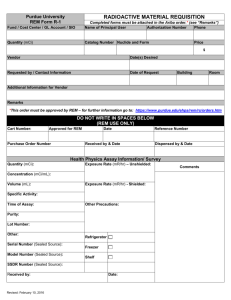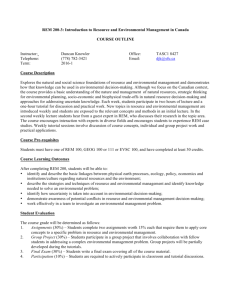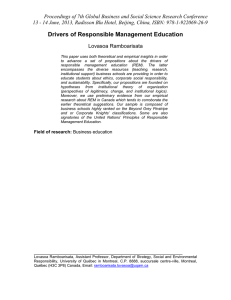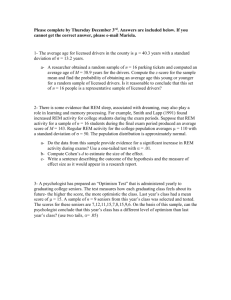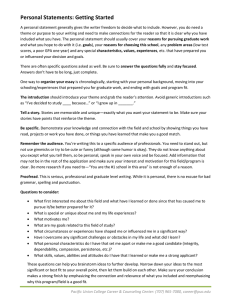Resource Management MS Program Strategic Planning Outcome Unit Report 2012-2013
advertisement
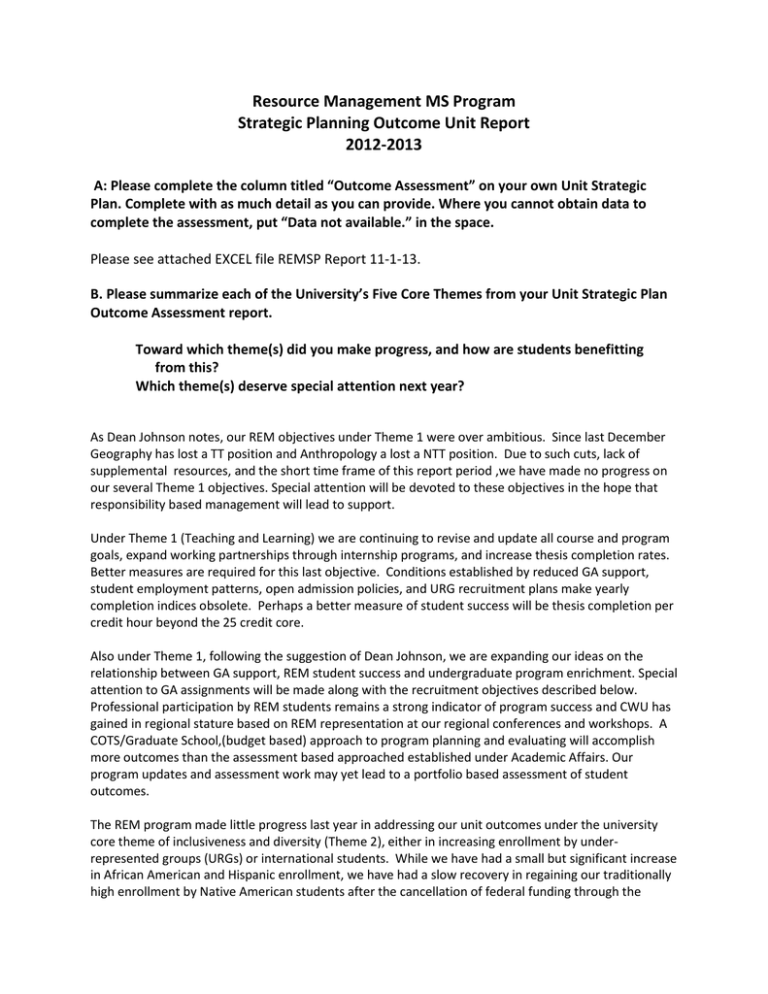
Resource Management MS Program Strategic Planning Outcome Unit Report 2012-2013 A: Please complete the column titled “Outcome Assessment” on your own Unit Strategic Plan. Complete with as much detail as you can provide. Where you cannot obtain data to complete the assessment, put “Data not available.” in the space. Please see attached EXCEL file REMSP Report 11-1-13. B. Please summarize each of the University’s Five Core Themes from your Unit Strategic Plan Outcome Assessment report. Toward which theme(s) did you make progress, and how are students benefitting from this? Which theme(s) deserve special attention next year? As Dean Johnson notes, our REM objectives under Theme 1 were over ambitious. Since last December Geography has lost a TT position and Anthropology a lost a NTT position. Due to such cuts, lack of supplemental resources, and the short time frame of this report period ,we have made no progress on our several Theme 1 objectives. Special attention will be devoted to these objectives in the hope that responsibility based management will lead to support. Under Theme 1 (Teaching and Learning) we are continuing to revise and update all course and program goals, expand working partnerships through internship programs, and increase thesis completion rates. Better measures are required for this last objective. Conditions established by reduced GA support, student employment patterns, open admission policies, and URG recruitment plans make yearly completion indices obsolete. Perhaps a better measure of student success will be thesis completion per credit hour beyond the 25 credit core. Also under Theme 1, following the suggestion of Dean Johnson, we are expanding our ideas on the relationship between GA support, REM student success and undergraduate program enrichment. Special attention to GA assignments will be made along with the recruitment objectives described below. Professional participation by REM students remains a strong indicator of program success and CWU has gained in regional stature based on REM representation at our regional conferences and workshops. A COTS/Graduate School,(budget based) approach to program planning and evaluating will accomplish more outcomes than the assessment based approached established under Academic Affairs. Our program updates and assessment work may yet lead to a portfolio based assessment of student outcomes. The REM program made little progress last year in addressing our unit outcomes under the university core theme of inclusiveness and diversity (Theme 2), either in increasing enrollment by underrepresented groups (URGs) or international students. While we have had a small but significant increase in African American and Hispanic enrollment, we have had a slow recovery in regaining our traditionally high enrollment by Native American students after the cancellation of federal funding through the Native American Fellowship Program. This year we plan to focus on working with CWU’s Graduate School, Public Relations, Enrollment Management and Student Support Services to create overall recruitment strategies and materials that in part focus on increasing URG enrollments. In addition, we plan to help increase inclusivity by developing partnerships with CWU’s Museum and Ethnic Studies programs to sponsor events and projects related to URGs. REM faculty and students have made good progress in meeting unit outcomes under the university core theme of scholarship and creative expression (Theme 3), particularly participation in SOURCE (70% participation by active REM faculty) and our success rate for submitted grants and contracts (50% higher than the expected performance level). This year we will work to establish a better reporting method to set a better baseline and track student-faculty co-authored publications (we especially hope Faculty 180 can be used for this, though better coordination in the timing of activity reports and outcome unit reports will be needed to accommodate this). In addition, we have added a new unit outcome to address and track this year: submission of internal and external grant proposals by REM students. This added objective will require coordination with the Graduate School to better track performance, and also depends on increasing internal research support for REM students. We feel special attention in this area will be critical to the proposed revitalization of our Graduate School and the support of facultystudent research collaborations. Also under Theme 3 we all need to devote special attention to: distribution of project indirect, equipment maintenance, clerical and research staff support, and sustained reassignment of faculty load. The full success of CSI, CWAS and the future Institute for Sustainable Energy hang in the balance. It is difficult to separate REM program progress from the achievements of the Anthropology and Geography department faculty under Theme 4, enhancing public service and engaging our communities. There is strong evidence that REM creates extraordinary achievements in general public outreach and community collaborations through the combined efforts of our faculty and graduate students. Restoring TT, NTT, and GA positions will build on past and current successes. REM faculty made good progress in meeting unit outcomes under the university core theme of resource development and stewardship (Theme 5). In maximizing the financial resources to the university by revitalizing contract and grant programs, 30% of active REM faculty participated in external grants and contracts (10% higher than the expected performance level), with total funding levels averaging $23,000 per active REM faculty (just below the expected performance level). In addition, to assist with developing an enrollment management plan, the REM program developed new advertising and marketing tools, including updated information on our website as well as a new program flyer distributed through the internet. This year, further development of new recruitment strategies and advertising materials will be a primary objective for the REM program. Working in conjunction with CWU’s Graduate School, Public Relations, Enrollment Management and Student Support Services, REM faculty will be exploring and implementing several strategies, including further updating our advertising materials, improving our web presence, exploring new advertising forums and “roadshow” opportunities, as well as setting up sister program partnerships. C. How do you intend to utilize the data gathered this year to assist you in developing stronger programs? Currently the data provided by Organizational Effectiveness has little relevance to many of the unit outcomes outlined in the strategic plan to strengthen the REM graduate program. Creating accurate baselines and tracking performance under many of the unit outcomes will require better coordination between individual departmental reporting (as several contribute active faculty to the REM program), the Graduate School, SOURCE, and Faculty 180 (though better coordination in the timing of activity reports and outcome unit reports will be needed to accommodate this). D. Based on your learning from this first year report, what parts of your strategic plan will you modify, add to, or omit for next year? (Please attach an updated Strategic Plan with changes highlighted.) Please see attached EXCEL file REMSP Report 11-1-13. Elements that have been added or changed are in italic print. Changes reflect suggestions made by the COTS Dean related to his evaluation of last year’s plan, as well as lessons learned trying to address the outcomes developed for the initial plan. Primary data needs: Time to completion/graduation Demographic data for enrolled students REM graduate assistantship teaching duties Graduate student conference participation, co-authored papers/presentations Faculty grant submissions and success rates Faculty public outreach activities 9talks and board/commission memberships) Faculty research contract activity and related funding amounts
